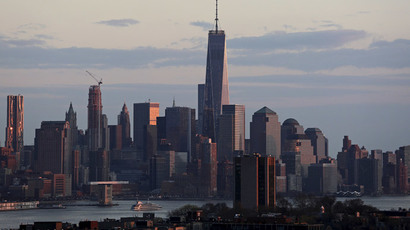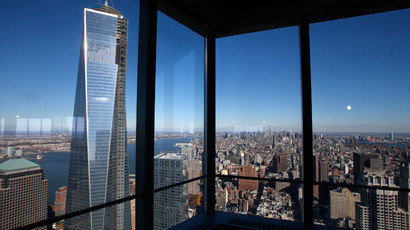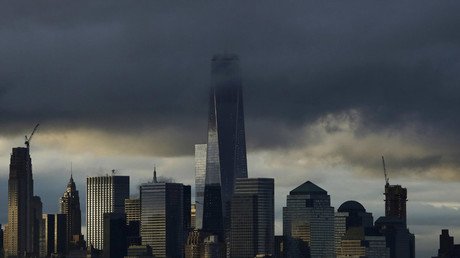Activist exposes US law firms advising foreigners on loopholes to invest ‘dirty money’

In the wake of an unprecedented crackdown on foreigners buying luxury property with “dirty money” in America, an undercover activist secretly filmed US lawyers’ insights into loopholes on how corrupt officials could hide their identities to buy VIP property.
An undercover investigator from the anti-corruption charity Global Witness (GW), presenting himself as an “adviser to an African mining minister,” videotaped interactions with 13 US law firms, explaining how his imagined “client” could pay for luxury property in the US with his “grey money.” The film – dubbed Undercover in New York – and the report of the activist organization were published on the last day of January and were covered by The New York Times.
The golden key that opened the doors to top New York lawyers was the declared intention of the “minister” – who earned the salary of a teacher – to buy a $10 million Manhattan brownstone townhouse, a Gulfstream private jet worth $20 million, and a “[Roman] Abramovich [style] yacht” that would be “around” $200-$300 million.
According to the backstory created by the undercover investigator, the “minister” earned his fortune through “helping companies receive mining concessions in his country.”
To hide the ownership of all that property – quite legally – from the US authorities and anyone back home would be nothing new for the American lawyers, they explained for the (involuntary) record.
“We have to scrub it at the beginning, if we can, or scrub it at the intermediary location,” Mark Koplik, a managing partner of Henderson & Koplik on Manhattan’s Lexington Avenue, told the disguised GW investigator.
Koplik also suggested a number of legal moves to hide the “paper trail” behind the money transactions, such as using family trusts.
“The smaller ones are often more flexible and understanding and less concerned about their reputation, because they fly to a greater extent below the radar screen,” he explained.
Tax haven: US ‘threatens’ global efforts to fight tax evasion, financial crimes https://t.co/GbMggM10FTpic.twitter.com/ehWKLSQD4p
— RT America (@RT_America) November 3, 2015Another scheme was proposed by James Silkenat, a partner at Sullivan and Worcester, who occupied the chair of the president of the American Bar Association while GW was filming its revelations in 2015.
The loophole involves creating a “complex web” of ownership companies “to insulate his ownership from public view.”
“Company A is owned by Company B, who is owned jointly by Company C and D, and your party owns all of or the majority of the shares of C and D,” Silkenat explained.
A corporate entity could shield “whoever’s buying it from public discussion,” which is important since big apartment buildings in New York could have a price tag of between $30 and $90 million.
Using several limited liability companies in a single “food chain” helps foreigners to remain incognito in owning American property – and is not prohibited in the US, Silkenat’s colleague, Hugh Finnegan, said.
The authors of the report say none of the lawyers filmed took the man on as a client and none of them committed a crime.
All of the suggestions made by the US lawyers about hiding the money and investing it into property were perfectly legal, since both Silkenat and Finnegan decried acting inappropriately during “a preliminary meeting,” adding that they found the undercover activist to be “dishonest and untrustworthy” and would “under no circumstances ... ever take on such a client.”
“We told him that there would be a need to conduct due diligence on the background and past activities of his purported client, as well as the sources of the funds his ‘client’ was seeking to invest,” Silkenat and Finnegan said in a statement to the Guardian.
Avoiding anti-money laundering checks by the Financial Crimes Enforcement Network (FinCEN) has been relatively easy so far, through exploiting a legal loophole when the money is sent directly to a US law firm, thus avoiding probing questions about the source of income.
But starting from March the US government is set to launch a massive crackdown to prevent luxury Manhattan apartments being bought with dirty cash by international criminals and corrupt foreign officials.
“We are seeking to understand the risk that corrupt foreign officials, or transnational criminals, may be using premium US real estate to secretly invest millions in dirty money,” said FinCEN director Jennifer Shasky Calvery.
The World Bank estimates that $1 trillion in bribes paid worldwide are ultimately used to buy American property through grey schemes, and the US financial authorities are now set to expose the true beneficial owners of the property in Manhattan and Miami.
Still, the US authorities “don’t send lawyers to jail, because we run the country,” Mark Koplik told the Global Witness filmmaker.















